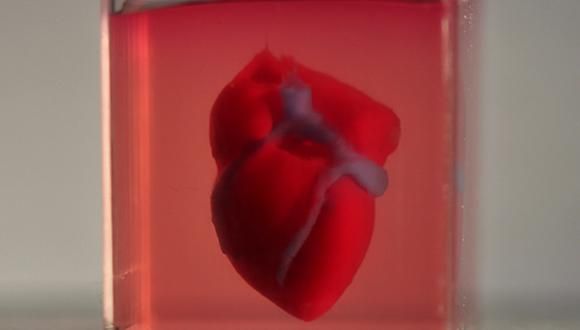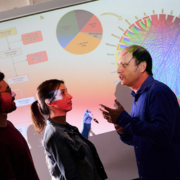3D printed heart used to test life-saving drugs
Pharmaceutical company Bayer will test new drugs using human heart tissues 3D-printed in Tel Aviv University
Last April, Prof. Tal Dvir of the George S. Wise Faculty of Life Sciences, the Iby and Aladar Fleischman Faculty of Engineering and his team successfully produced the first-ever 3D-printed heart, from tissue extracted from a patient. The researchers estimate that it will be possible to print personalized organs and tissues within 10-15 years, thus eliminating the need for organ donations and the risk of transplant rejection. Meanwhile, this innovative technology already has the potential to revolutionize a different medical field: drug screening.
Saving precious time
“In a Petri dish, all the cells line up in 2D, and it’s only one type of cell” says Prof. Dvir. “In contrast, our engineered tissues are 3D-printed, and therefore better resembles real heart tissues. Our printed tissues contain cardiac muscle, blood vessels and the extracellular matrix which connects the different cells biochemically, mechanically and electrically. Moving away from Petri dishes to 3D printed tissues could significantly improve drug tests, saving precious time and money with the hope of producing safer and more effective medication”.
Ramot at Tel Aviv University has signed a collaboration agreement with Bayer to develop and validate a platform for in vitro cardiotoxicity screening, using human heart tissues 3D-printed in Prof. Tal Dvir’s Laboratory for Tissue Engineering and Regenerative Medicine. In upcoming years, Prof. Dvir’s team and Bayer plan to test new medication for toxicity and efficacy using printed whole human hearts.
Drug candidates go through several phases of screening before reaching pharmacies. First, the new chemical compound is tested on human tissue cultures. Then, it is administered to lab animals. Finally, the drug is approved for human clinical trials. Prof. Dvir’s 3D-printed tissues could enable faster, cheaper and more efficient screening than Petri dishes.
Prof. Dvir hopes to offer Bayer, in the near future, pre-clinical trials on complete printed organs. “Our agreement is just the beginning,” says Prof. Dvir. “Our end goal is to engineer whole human hearts, including all the different chambers, valves, arteries and veins – the best analogue of this complex organ – for an even better toxicological screening process.” To make further use of the application, Ramot at Tel Aviv University licensed the technology to a spin-off company called Matricelf, which first focuses on engineering personalized spinal cord implants to treat paralyzed patients. Matricelf has recently secured a large investment, allowing it to reach clinical settings in the near future.
New, innovative drugs
Keren Primor Cohen, Ramot CEO said: “Prof. Dvir’s platform groundbreaking innovation is very promising. We believe that this collaboration with Bayer will support the evaluation and development of new drugs and is a step in building long-term relations with Bayer that we hope will benefit both partners and ultimately patients.”
“We are excited to start this new collaboration with Tel Aviv University, which will address a new area of early assessment of safety and tolerability of drug candidates,” said Eckhard von Keutz, Head of Translational Sciences at Bayer. “We already have a global network of partners and this new project will enable Bayer to expand its open innovation activities to Israel, which provides a dynamic ecosystem for innovation in biotech and medical research.






